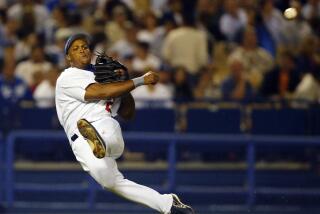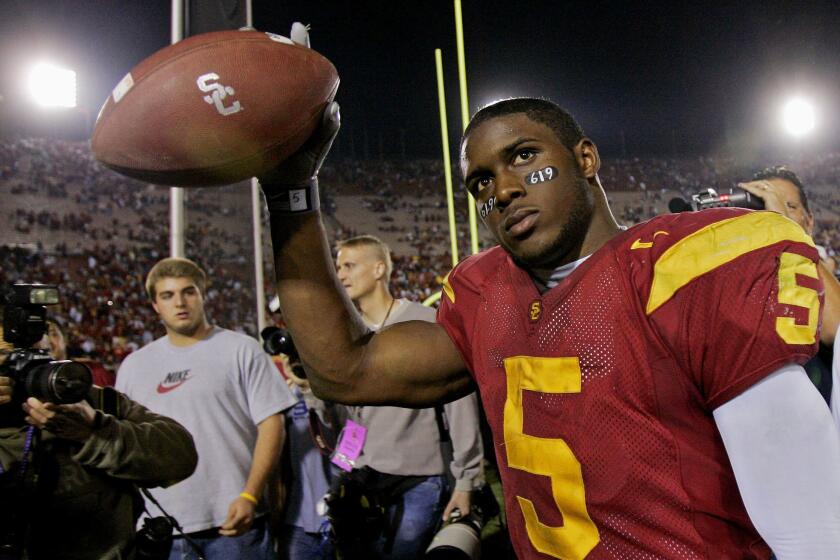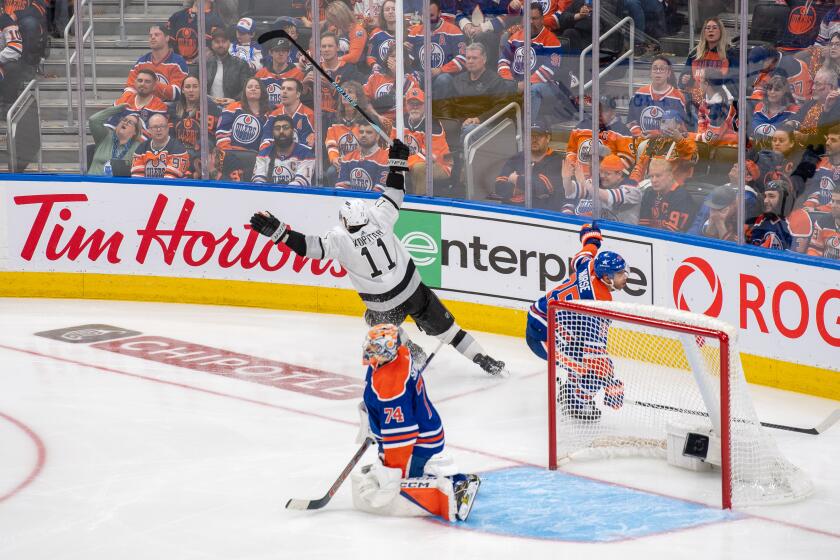Baseball Hall of Fame back to normal elections, sort of
The Hall of Fame shut its doors to the living last year. That was a metaphor, or so we were told. No breathing inductees, and down the slippery slope to irrelevance.
Nonsense then, absurdity now.
One year after the Baseball Writers’ Assn. of America didn’t elect anyone, the Hall of Fame is poised to welcome what might be the largest induction class in its 75-year history.
Greg Maddux will be elected when the tally of the votes is announced Wednesday, and he will challenge Tom Seaver’s record 98.84% of the ballots. Tom Glavine and Frank Thomas should be locks, and Craig Biggio and Mike Piazza appear on the bubble, based on a Baseball Think Factory survey of the one-fourth of the voters who have revealed how they voted.
It has been 15 years since the BBWAA elected three players, 59 years since it picked four. The only five-player class was the first — Ty Cobb, Walter Johnson, Christy Mathewson, Babe Ruth and Honus Wagner.
Joe Torre, Tony La Russa and Bobby Cox were elected by committee last month. If three players join the three managers, the Hall of Fame will induct a record-tying six members come July.
There will be no shutout next year, either. Randy Johnson, Pedro Martinez and John Smoltz will see to that.
These are delightful developments for the Hall of Fame, where attendance and revenue have declined in recent years. Cooperstown, N.Y., turned into a ghost town during induction weekend last summer.
Yet, Jeff Idelson, president of the Hall of Fame, said he was perfectly fine with the results of last year’s election.
“Were we disappointed? Absolutely,” Idelson said. “But we remain confident in the process. Just because no one was elected didn’t mean the process was broken.”
“The process” is shorthand for the annual BBWAA election, as authorized by the Hall of Fame. “The results” is shorthand for the rejection of Barry Bonds, the only player to be selected most valuable player seven times, and Roger Clemens, the only player to win the Cy Young Award seven times.
The Hall of Fame is resolutely resistant to providing voters with any judgment on the steroid era. The ballot asks voters to consider “integrity, sportsmanship [and] character” among six criteria for election.
“We feel that giving the individual voter the opportunity to make his or her own value judgment is important to the process,” Idelson said.
Clemens got 38% of the vote last year, Bonds 36%. The projections appear similar this year for both players.
A player needs 75% for election, 5% to remain on the ballot. That could leave two of baseball’s most dominant players in a 15-year purgatory, a stench that could so linger that the Hall of Fame might be better served to intervene rather than passively let its jewel event deteriorate into an annual referendum on the steroid era.
Idelson is not convinced the results would be any different if the Hall of Fame stripped the voting authority from the BBWAA and awarded it to fans, broadcasters, retired players or any other potential electorate.
“If you were to task the election process to any group, there would still be some consternation and debate about what constitutes a Hall of Famer,” Idelson said. “The baseball writers, as the group we have chosen, have done a great job.”
The Los Angeles Times does not permit its writers to vote, although I would cast my ballot for Bonds and Clemens. But what might appear to be the Hall of Fame abdicating its responsibility to set steroid standards for the BBWAA election is in reality the reflection of the populace in general.
There is no consensus among fans on how Bonds and Clemens should be treated for Hall of Fame purposes, let alone other players linked to performance-enhancing substances.
Should voters limit their analysis strictly to statistics, since we will never know all the players that used steroids? How should steroid use be considered by voters charged to determine integrity, sportsmanship and character?
Once a player serves a drug suspension, he cannot be punished further by his team. Should he be punished in Hall of Fame voting? What about players linked to PED use in government investigations? And what about players linked by circumstantial evidence that might seem stronger to one voter than another?
The BBWAA voting body changes over time, and a younger electorate probably would look more favorably upon Bonds and Clemens. Yet, the Cooperstown ambivalence is an appropriate mirror to the American ambivalence.
The Hall of Fame opens its doors again Wednesday — widely, if not widely enough for all.
Twitter: @BillShaikin
More to Read
Get our high school sports newsletter
Prep Rally is devoted to the SoCal high school sports experience, bringing you scores, stories and a behind-the-scenes look at what makes prep sports so popular.
You may occasionally receive promotional content from the Los Angeles Times.







